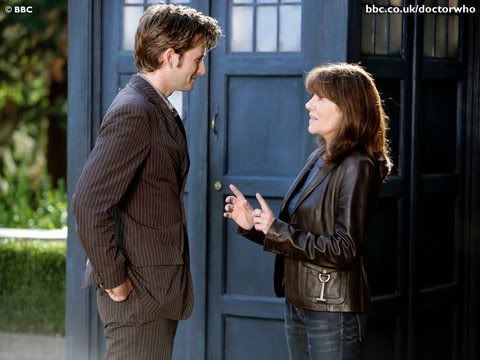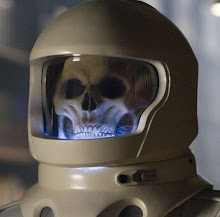What is Doctor Who?
DW is a British Science Fiction TV show that, at it's heart, is about a mad man with a box. The 'mad man' is the Doctor; a highly intelligent and quite brilliant man. The 'box' is his TARDIS, a machine that can travel anywhere and anywhen in time and space. That's the core concept of DW; the Doctor, travelling through time and space in his blue box, having adventures and solving problems as he goes. But obviously there's a bit more t
 o it than that.
o it than that.First off, the Doctor may look human, but actually he's an alien - one of a highly advanced race known as the Time Lords. The Time Lords were the first species to discover time travel, and because of that they made it their duty to protect time, and never, ever interfere with the course of history. The Doctor disagreed with this Time Lord policy of non-interference, and so he stole his TARDIS and ran away. The TARDIS, of course, is Time Lord technology; one of millions that the Time Lords had in their possession. Even the Doctor's, a museum piece in comparison to newer models, is able to travel through the entirety of space-time. At first the Time Lords hunted the Doctor for his 'crimes' of theft and interference in time, sought to put him on trial; then they reached an agreement with him, and left him alone. But now the Time Lords are gone - killed in the Time War, a massive battle that spanned whole civilisations - and only the Doctor, and his lone TARDIS, are left.
Secondly, whilst Time Lords look human, there are a few key differences. For example, Time Lords such as the Doctor have two hearts. But the main difference between humans and Time Lords is the Time Lord ability to 'regenerate'. When a Time Lord is close to death, they can regenerate every single cell in their body, a way of healing themselves and starting afresh. This process of regeneration completely changes a Time Lord's appearance, but leaves their consciousness and memories intact. Of course, in real life terms this means a new actor can come in and play the Doctor, the same character but with a different face. To date, the role has been occupied by:
- William Hartnell (1963-1966)
- Patrick Troughton (1967-1969)
- Jon Pertwee (1970-1974)
- Tom Baker (1975-1981)
- Peter Davison (1982-1984)
- Colin Baker (1985-1986)
- Slyvester McCoy (1987-1989)
- Paul McGann (1996)
- Christopher Eccleston (2005)
- David Tennant (2006-2009)
- Matt Smith (2010-)
If you've never watched or heard of the show before now, then Doctor Who probably sounds like the maddest, stupidest idea for a TV show you could imagine. But it's been going since 1963, had 11 different central actors, 6 different spin-offs and 32 different series, and it's the biggest, most successful Scifi show ever. So how did I get in to watching it?
How I started watching Doctor Who
I first heard of the show back in 2006, when a friend of mine who already watched it recommended it to me. It sounded cool, so that Saturday night I turned on my TV and tuned in to School Reunion. In this particular episode, the Doctor - who at the time was in his 10th incarnation, played by David Tennant - investigates alien activity surrounding a modern day comprehensive school, and bumps into his old friend and former companion Sarah-Jane Smith. I was ten at the time, and I had basically no idea what was going on, but I loved it. The monsters were cool, the characters funny, and the Doctor's farewell to Sarah-Jane was so sad, even though I had no idea who SJ was. I followed the series loosely from that point
 on, catching episodes when I had the chance, but it was only after Doomsday (the incredible series finale) that I decided I needed to get more information about this strange, fantastic show.
on, catching episodes when I had the chance, but it was only after Doomsday (the incredible series finale) that I decided I needed to get more information about this strange, fantastic show.By the time Christmas 06 rolled around, I had read up a lot of info on DW. I knew about 'regeneration', and I knew that Tennant was far from the first actor to inhabit the role of the Doctor. I knew that 'Series 2', the series I had just watched, starring Tennant, was not actually the show's second series. In fact, it was really 'series 28'; after an original 26 series run, from 1963 to 1989, the show had been cancelled. A one-off movie had been commissioned in 1996, and then in 2005, the show was revived. It was 'Series 2' of the show's revived run, that was all. All of these things, I had learned, mostly from wikipedia. Over the next few years I would watch the show attentively, adoring Tennant's run as the 10th Doctor. I bought series 1 (actually series 27) on DVD and watched through Eccleston's run as the 9th Doctor. I loved New Who, as the revived show was called, and couldn't get enough of it.
It was in 2009 that Classic Who, the older series, brought itself to prominence for me. I knew quite a bit about the show's original run, but I had mostly stuck to New Who until then. But with the announcement of a 'hiatus' year, with no full series, I decided to try and get into watching some of the show's older episodes, to familiarise myself with it's roots. And, of course, I loved it. Since then, my love of all forms of DW has just gotten bigger, and I've continued watching right through the end of Tennant's era and the start of the 11th Doctor's, Matt Smith. Right now, in 2011, I'm waiting for the second half of series 6 (actually series 32) to air, starring Smith alongside Karen Gillan and Arthur Darvill, as companions Amy and Rory.
So I've talked about the show, and how I got into it, so that just leaves one more question: why is Doctor Who so brilliant?
Why I Love Doctor Who
I love Doctor Who because it can tell any story it wants to. It can be comedy, drama, romance, horror, adventure, space opera, mystery. The show thrives on innovation and reinvention, and with every new director, writer, producer, actor, the show gains new themes and directions, new ideas and stories. Compare the emotional, character-driven stories of the Eccleston/Tennant eras with the fairytale, almost gothic feel of the Smith era. The show can adapt to any story, any idea, and this versatility means that in nearly 50 years, it still has stories to tell.
This has turned into one hell of a long blog post, and I really don't have time to talk about my fanseries, Doctor Who Re-Incarnated, or the Doctor Who fan gathering of Friday Night Who, or even the Doctor Who podcasts I listen to. Those will have to come another time, I'm afraid. For now, though, I'm glad I've told you all about Doctor Who, and why I watch it. Bye for now!
PS: I'm still reading The Coming Of The Terraphiles, but I promise I'll have a review up as soon as I'm done.

No comments:
Post a Comment